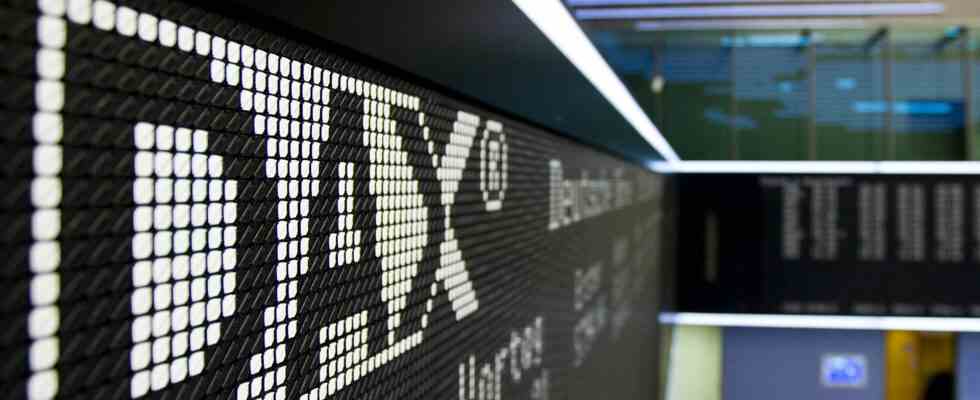market report
Status: 05.09.2022 07:39 a.m
The DAX is facing a drastic price drop. After the Nord Stream 1 gas pipeline stopped operating, investors fear devastating economic consequences for Germany and Europe.
Severe losses are expected on the German stock market at the beginning of the week. The broker IG assesses the DAX 3.4 percent lower at 12,612 points. This would completely wipe out the gains of 3.3 percent to 13,050 points made on Friday in one fell swoop. In fact, the prospects for German standard stocks have clouded over significantly since then.
Investors fear gas crisis and economic downturn
On Friday evening after the XETRA stock exchange closed, the Russian state-owned company Gazprom announced that, contrary to previous announcements, gas deliveries via the Nord Stream 1 pipeline would not be resumed after an alleged maintenance break. With this, Russia plunges the European economies completely into the energy crisis.
Experts and investors are now even more concerned about an economic slump. At the same time, rising energy prices are likely to fuel inflation and force the central banks to adopt even tighter monetary policies, according to the bleak scenario being traded on the markets at the beginning of the week.
DAX on course for the year low
Under these conditions, the German leading index, which is already battered in terms of charts, should soon be subjected to a stress test from its annual lows of May and July at 12,400 points. In the previous week, the DAX had come dangerously close to this mark, but was finally able to catch and stabilize at the 12,600 mark.
Energy crisis in Europe weighs on Nikkei
The energy crisis in Europe has not left investors on the Asian stock exchanges cold either. News of further lockdowns due to the corona virus in China is adding to the nervous mood. The Nikkei, which comprises 225 values, is at 27,645 points shortly before the end of trading in Tokyo and is therefore very close to its previous day’s closing price.
“Europe is facing a bleak energy outlook and there are numerous reports of companies cutting back production,” said NAB’s Tapas Strickland. “And the ECB will undoubtedly decide on a rate hike this week.” A rate hike of 75 basis points in the euro zone was recently priced in on the money market.
Significant price losses on Wall Street
Negative impulses for the European markets are also coming from Wall Street. At the end of the week, the gas crisis, inflation shock and fears of recession had once again spoiled investors’ mood. After initial price gains as a result of robust US labor market data, the indices turned negative on Friday.
The Dow Jones of standard values closed 1.1 percent lower at 31,318 points. The tech-heavy Nasdaq fell 1.3 percent to 11,630 points. The broad S&P 500 lost 1.1 percent to 3924 points.
Euro falls to 20-year low
The “safe haven” US dollar is in demand today in Asian foreign exchange trading, while the European common currency is clearly under pressure. The euro falls below the $0.99 mark for the first time in 20 years. At the low, only 0.9888 dollars are paid for one euro.
RWE and E.ON shares collapse
The planned skimming of chance profits from energy companies triggers a sell-off at RWE and E.ON. The shares of the two suppliers fall by up to 7.3 percent before the market. The idea is not new, but is now becoming concrete, says a broker.
Siemens Energy expected back in the DAX
The meal kit supplier Hellofresh will have to vacate its place in the first stock market league in September. According to current calculations by the investment bank Stifel, Siemens Energy, which was only demoted in March, is returning to the DAX. Deutsche Börse will announce possible index changes tonight after close of trading. They will then come into force on Monday, September 19.
Bayer pays $40 million in US settlement
The Bayer group has agreed to a multi-million dollar settlement in the USA because of alleged illegal commissions and misrepresentations in the marketing of certain drugs. Bayer will pay around $40 million to settle the case, the Justice Department said on Friday (local time) in Washington. The company did not admit guilt.
JPMorgan before Germany offensive?
German banks are threatened with competition in the online private customer business from the largest US money house JPMorgan. The bank apparently wants to expand in Germany and is therefore looking for employees with expertise in retail banking. This is suggested by around 80 job advertisements with which the US market leader is currently recruiting new employees in Berlin and Frankfurt. In them, the bank formulates concrete goals for the German market.

